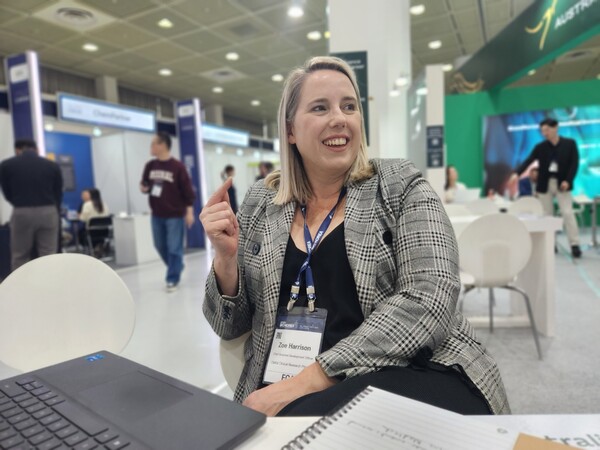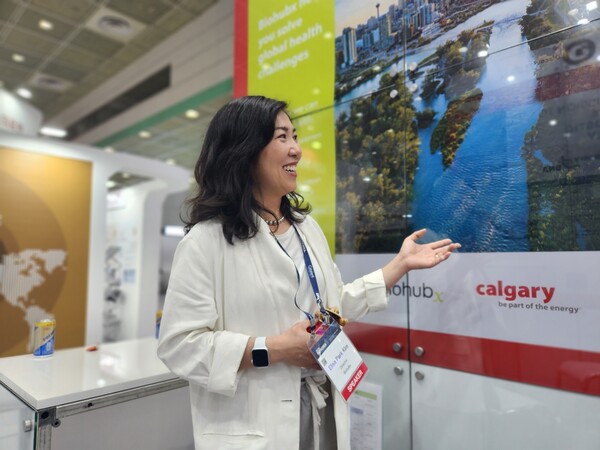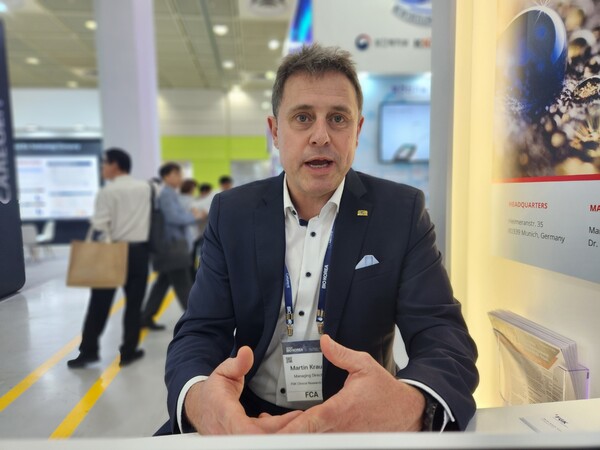BIO Korea closed the curtains on its three-day biopharmaceutical conference on Friday, drawing an impressive crowd of nearly 30,000 participants from 730 companies representing 51 countries.
Among them, the Australian, Canadian, and German biopharma delegates were heavily represented at the exhibition booths at COEX, southern Seoul.
Korea Biomedical Review (KBR) spoke with representatives of these delegates on the sidelines of BIO Korea on Friday to uncover their motivations for attending this year’s event and whether they plan to participate again in the future.
According to Julie Quinn, the Senior Trade and Investment Commissioner of Australia, Korean biotech and pharmaceutical companies have shown great interest in Australia's clinical trial landscape. Quinn revealed that many Korean companies are actively involved in phase 1 clinical trials within Australia.
Quinn said Australia's participation in BIO Korea has been consistent for the past nine years. This year's delegation was particularly noteworthy as it comprised a record-breaking 36 organizations. Looking ahead, Quinn expressed her intent to further expand Australia's representation at the conference in the upcoming year.
However, she noted that the Australian delegates’ focus was shifted from regenerative medicines to Australia’s growing strengths in clinical trials, digital therapeutics, and medical technology.

Zoe Harrison, Chief Business Developer at CMAX, an Australian clinical trial center, discussed the company's focus on early-phase clinical trials for international clients. Notably, their largest clientele includes companies from the United States, Korea, and China.
“We specialize in first-in-human studies of innovative drug candidates,” said Harrison. “We work across a variety of therapeutic investigational compounds encompassing small molecules, monoclonal antibodies, vaccines, gene therapies, and biosimilars.”
CMAX utilizes the Australian clinical trial notification (CTN) scheme, which enables them to fast-track clinical trials. This process reduces both time and costs typically associated with the Investigational New Drug (IND) application process. Additionally, eligible companies can claim up to a 43.5 percent rebate on qualifying research and development (R&D) costs, providing financial benefits.
“Although Korea also conducts several early-stage trials, our demographic also includes Caucasian data which is helpful for entering diverse markets like the U.S.,” she explained.
As Australia stands as a leader in decentralized clinical trials (DCTs), she also mentioned the company’s use of digital platforms for data collection from clinics in the community to enable wider participation in clinical trials.
Harrison also explained that the company plans to engage more with Korean companies later this month as a Korean delegation is scheduled to visit Adelaide for the AusMedtech 2023 conference.
Canada is also actively seeking Korean innovative companies to work with Canadian counterparts in healthcare.
Korea, currently commemorating 60 years of diplomatic relations with Canada, anticipates an upcoming visit from Prime Minister Trudeau between May 16-18.
Last year, the Canadian embassy hosted a digital health forum in Korea to synergize its flourishing AI sector with Korean digital solutions.
The Canadian Trade Commissioner of Life Sciences, Jimin Kim, shared that they annually invite proposals from eligible Korean companies for joint research with Canadian companies in innovative areas such as life sciences, ICT, and clean tech.
Aside from this, Canada is also interested in forging partnerships in oncology, cell and gene therapies, Kim explained.
Although it was only Canada’s second time participating in BIO Korea, Kim expressed her wishes to participate in the conference in addition to the exhibition booth next year. Unveiling other plans for the year, she mentioned the upcoming BIO USA conference next month where she will help facilitate collaborations between Korean and Canadian companies.
KBR also had a conversation with Biohubx, a notable Canadian not-for-profit organization that provides support to health ventures during the growth and scale-up stages.
Biohubx’s Director of Business Development, Elisa Park Kim, highlighted unique opportunities for small and medium-sized Korean enterprises to enter the lucrative North American market through its incubator program.

“We offer a de-risked soft-landing program alongside physical infrastructure allowing companies to commercialize earlier with a lot less capital as we do not take equity,” Park explained. “Canada also has a favorable exchange rate for young companies trading at 70 cents to the dollar and there is no requirement to go through a specific program in this hub.”
She outlined some priority areas for the first hub including the life sciences and health tech area toward AI-integrated projects ad another hub which will include biomanufacturing with an innovation center for medical device simulation for clinical training.
Park specifically noted that the city of Calgary is interested in supporting innovations in the pediatric space as it currently lags behind adult care.
However, she maintained that all hubs will be connected and all innovative ideas will be welcomed once it does not overlap with another company in the hub. She also pointed out Alberta’s competitive edge in operating a one-integrated healthcare system which is a benefit of the hub that many companies often enjoy.
“It’s our first time at BIO Korea but we wish to return to continue expanding our network,” Park said.
On the other end of the spectrum, FGK’s Managing Director Martin Krauss conveyed his experience as a participant returning for the fifth time to the conference but first time as part of Bavarian delegate which is home to Germany’s biggest biotech hub.

“As Korea is one of the up-and-coming biotech hubs, there is a lot of interest in the market as we see growing investments in Korea’s bioindustry,” Krauss commented. “We were one of the few European participants five years ago but now the show has grown much more on an international scale which underscores the need to return next year to maintain our relations with our Korean clients.”
FGK focuses on clinical trials from phase 1 to phase 3 studies, providing flexible services for small-medium-sized biotech companies.
Regarding the increasing trend towards DCTs, Krauss remarked, “Many trials are already using DCT components but there are still some regulatory hurdles including complete electronic informed consent and the direct shipment of investigational medicines or products to the patient which remains a cumbersome process.”
However, he noted that Europe is seeing greater harmonization in this area but there are still national peculiarities with certain DCT elements that require attention to aid the faster adoption of DCT.

